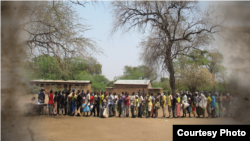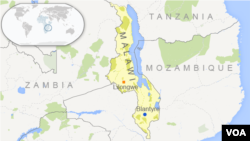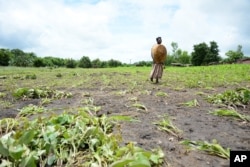In Malawi, the United Nations Children's Emergency Fund or UNICEF is carrying out a mass screening exercise for malnutrition in children under 5 years of age, in 25 of the country's 28 districts.
The exercise is in response to a recent vulnerability assessment report, which revealed that 2.8 million people in Malawi are facing food shortages.
Early one morning, the Chamba screening center in Malawi's old capital, Zomba, is jam-packed with mothers who want their babies screened for malnutrition.
Little food or work
Eliza Kadeya's 3-year-old child was diagnosed as malnourished.
The resident of Chiwanganya village told VOA she was not surprised.
"We don't have food and it is becoming difficult even to find piecework to earn money for buying some food. And, for example, most of the babies you hear crying here is because of hunger," Kadeya said.
Malawi is currently facing the worst food shortage in a decade, largely because of flooding and drought that hit the country last year.
Recent reports from communities and villages indicate an increasing food shortage and hunger problem.
Health screenings
The government has been implementing its malnutrition screening and treatment program since 2002 in more than 90 percent of the county's districts.
But statistics show that 50 percent of children are being seen and treated, largely because of a lack of medical supplies in public health facilities.
UNICEF said its screening exercise, supported by Britain's Department for International Development, seeks to ensure that almost all malnourished children across the country are being taken care of.
In Zomba alone, UNICEF seeks to screen about 6,000 children through its Community Management of Acute Malnutrition program.
Gilbert Dachi, UNICEF's nutrition specialist, said, "We can take care of these children through supplementary feeding programs meant for children with moderate acute malnutrition. We can also take care of them through an outpatient therapeutic program where we give them therapeutic feeds.
"The other aspect is when we get children with severe acute malnutrition, we still refer them for care at any nutrition rehabilitation center," Dachi said.
Affects development
Medics say if left unattended, malnutrition can be retrogressive to development.
Maggie Chiwaula, nutrition specialist in Malawi's Ministry of Health, said, "When children are malnourished, it means the caretakers will be busy taking them to hospitals for medical help. And when the child is sick [he or she] cannot understand at school. And also parents cannot even have time to go out in the fields and maybe do business when a child is sick."
Authorities said malnutrition cases can drastically decrease in Malawi if farmers are encouraged to switch from dependency on rain-fed agriculture to irrigation farming, a move they say would let them have food throughout the year.
However, national malnutrition figures have in the past few years stabilized at 60 percent, except in flood-hit districts of Chikwawa, Phalombe and Nsanje.















